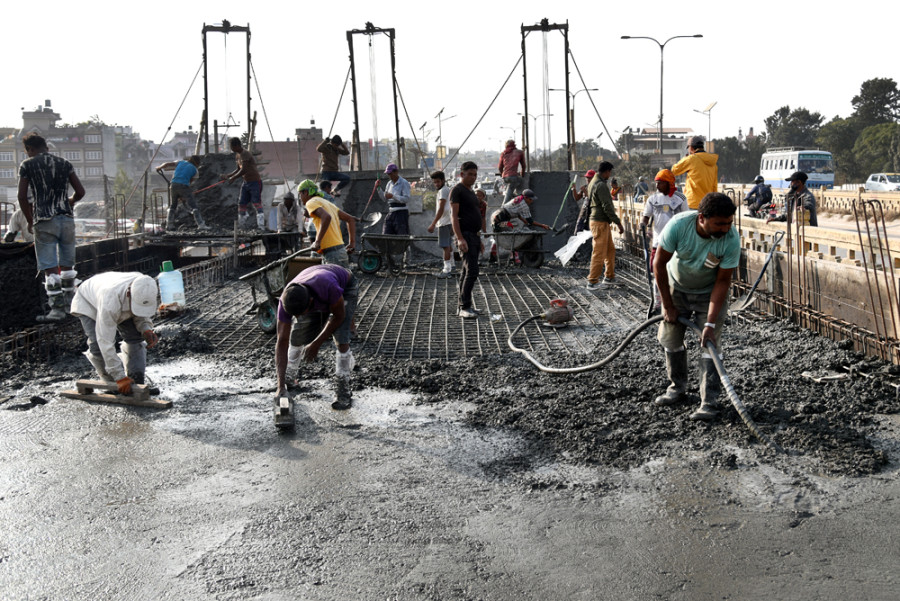National
Road department bars subordinate bodies from preparing bid package over Rs500 million
The move is aimed at stopping collusion among builders and checking the mobilisation cost.
Prithvi Man Shrestha
The Department of Roads has instructed its subordinate bodies not to prepare bid packages worth more than Rs500 million for construction of roads and bridges to discourage collusion among big contractors.
Under the Public Procurement Regulation, only local bidders can participate in bids up to Rs1 billion. But there is a tendency among government offices to make large bid packages close to Rs1 billion to enable just a handful of contractors to bid, the Public Procurement Monitoring Office has pointed out in its reports.
The procurement monitoring office, which is under the Prime Minister’s Office, has warned that such tendency—to limit competition—increases the cost for mobilising contractors.
A meeting of senior officials of the department on November 13 decided not to make bid package above Rs500 million, excluding value-added tax and contingency cost normally.
“This is aimed at increasing competition, as large packages allow only a handful of contractors to participate in a bid,” said Keshav Kumar Sharma, director general of the department.
According to officials at the department, chances of collusion among the contractors remain if only 4-5 builders could participate in the bidding process.
“As there are just around 20 contractors who can qualify to bid in the package of around Rs1 billion, it is necessary to ensure more contractors are included in the bidding process,” said Rajendra Raj Sharma, superintendent engineer at the Federal Road Supervision Office.
In the past, the Public Procurement Monitoring Office cited pointed out a number of incidents where it found indications of collusion when bids were invited for larger packages. For example, only four bidders passed technical qualifications to undertake the construction of road, drainage, sewer and land work in a tender called by the Special Economic Zone Development Committee on April 11, 2017.
But there were not much difference in the rates quoted by all four bidders against the estimated cost of Rs849.99 million. The SEZ Development Committee had called the tender for developing Block A of the garment processing zone in Simara.
Swachchhanda/Ashish JV quoted Rs848.94 million, while Kalika Construction quoted Rs848 million. Tundi Construction quotedRs841.36 million.
Before the contractors participated in the bid, Rupesh Construction Company had registered a complaint at the Public Procurement Monitoring Office claiming that Rs869.41 million and Sharma/Amar/Kanchharam JV quoted there was foul play to facilitate the Sharma/Amar/Kanchharam JV to secure the contract.
Sharma/Amar Kanchharam indeed won the contract for quoting the lowest price and the SEZ Development Committee signed an agreement with the joint venture company on September 12, 2017.
Furthermore, the bidders—Kalika, Tundi and Sharma/Amar/Kanchharam JV—quoted the same price for 105 items out of the 115 items to be used during the construction. Two of them have quoted the same price for eight of the remaining items.
The quoted price in the bids by all four contractors gives credence to the suspicion that there has been a cover bidding, states the assessment of the Public Procurement Monitoring Office in its annual report 2017-18. “This cannot be just a coincidence; it can be easily assumed that it is the result of organised planning.”
Last year, a report titled ‘A Collection of Reports on Public Procurement Monitoring and Complaints’ also pointed out possible collusion among bidders while participating in and bagging contracts for road and bridge projects in the under-construction Dharan-Chatara-Gaighat-Katari-Sindhuli road and the Galchhi-Trishuli-Mailung, Syaprubesi-Rasuwagadhi road in a similar manner.
Given this context, officials at the Department of Roads said that they had to act to address such issues. The move has also pleased the contractors. Rabi Singh, president of the Federation of Contractors’ Association of Nepal, said he didn’t know about the department’s decision but added it was a welcome move if it is true. “Federation’s official position has been that any bidding process should allow as many contractors as possible to participate,” he said.
He, however, pointed out that there is a tendency among the government offices to prepare micro-level criteria such as whether a contractor has done a certain quantity of earthworks and a certain volume of work related to a footpath in order to prevent a large number of contractors from participating in a bid.




 20.12°C Kathmandu
20.12°C Kathmandu















